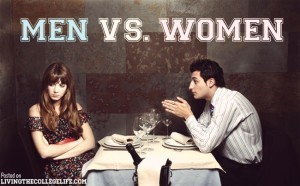Feminism must include men, and discussions of masculinity ["Men and women are partners, not rivals"]
This is my weekly newspaper column from The National
The trouble with women’s events about women’s rights is that all too often it can feel like women talking to other women about women’s problems. And, generally, there are almost never any men present.
This seems to be an absurd position, as women’s lives are intertwined with those of men. Don’t men care? If you’re a man and you’re upset by my question, then I’m pleased: it shows you care. If men do care about their mothers, wives, daughters and sisters – and womankind as a whole – then they need to be involved in social improvements for women.
 This will mean changes for men, too. So men need to be ready to explore, understand and embrace the changes that affect them. Yet the discussion around what it means to be a man today is muted. Fortunately, there are glimmers of hope that the meaning and role of masculinity is now on the table for discussion.
This will mean changes for men, too. So men need to be ready to explore, understand and embrace the changes that affect them. Yet the discussion around what it means to be a man today is muted. Fortunately, there are glimmers of hope that the meaning and role of masculinity is now on the table for discussion.
Before I get accused of overlooking women’s oppression in favour of the already privileged male elite, let’s be clear: a sensitive and future-facing women’s movement must be sensitive and future-facing when it comes to men, too. Men and women are social partners, not rivals.
We need to understand what it means to be a man. In the same way we challenge female stereotypes of what it means to be a woman, we must challenge outdated notions such as that of the domineering Neanderthal.
Research from advertising agency JWT London starts to explore the nuances of male stereotypes, and understand what masculinity today really means. For British men, for example, being emotional – something that has traditionally been a sign of weakness in men – is now a source of pride (62 per cent). Men are just as much at home in the kitchen as with doing traditional DIY. And, nearly half of men (43 per cent) feel that men are better rounded today due to the shift in gender roles.
At the beginning of this month, the inaugural Being a Man festival was held at the Southbank Centre, one of the UK’s leading arts venues. It follows the success of the Women of the World Festival, which first took place in 2012. Its commissioning was in recognition that men too need to talk about their anxieties, challenges and place in the world.
Studies like one by students at Zayed University are looking at generational changes and can give young men an insight into how masculinity has changed through the family line. And a recent groundbreaking book published in the United States finally gives an outlet to Muslim men to create some new options outside of the usual stereotypes of either being oppressive monsters or terrorist villains. “Salaam, Love: American Muslim Men on Love, Sex and Intimacy” gives a first-person peek into the kind of preoccupations that men have and would like to discuss, but which prevailing narratives prevent them from sharing.
As a women’s activist, I know how important it is for women to talk about womanhood, its challenges and how the system is currently rigged against women. The system’s consequences are violence, oppression, abuse and death. But the system is also rigged against men who are stifled by outdated expectations of masculinity, men who are expected to bottle up their feelings and struggle on in emotional isolation.
Creating space for discussions of both womanhood and manhood is not mutually exclusive. In fact, it’s vital to a healthy functioning society.
Shelina Zahra Janmohamed's Blog
- Shelina Zahra Janmohamed's profile
- 175 followers




